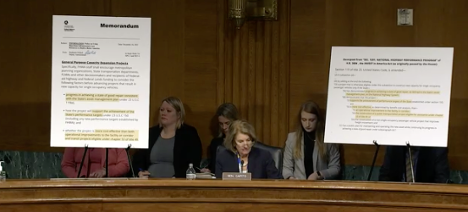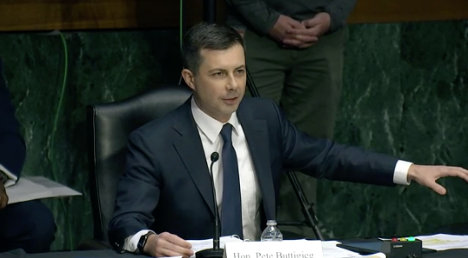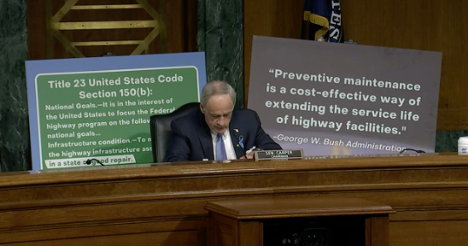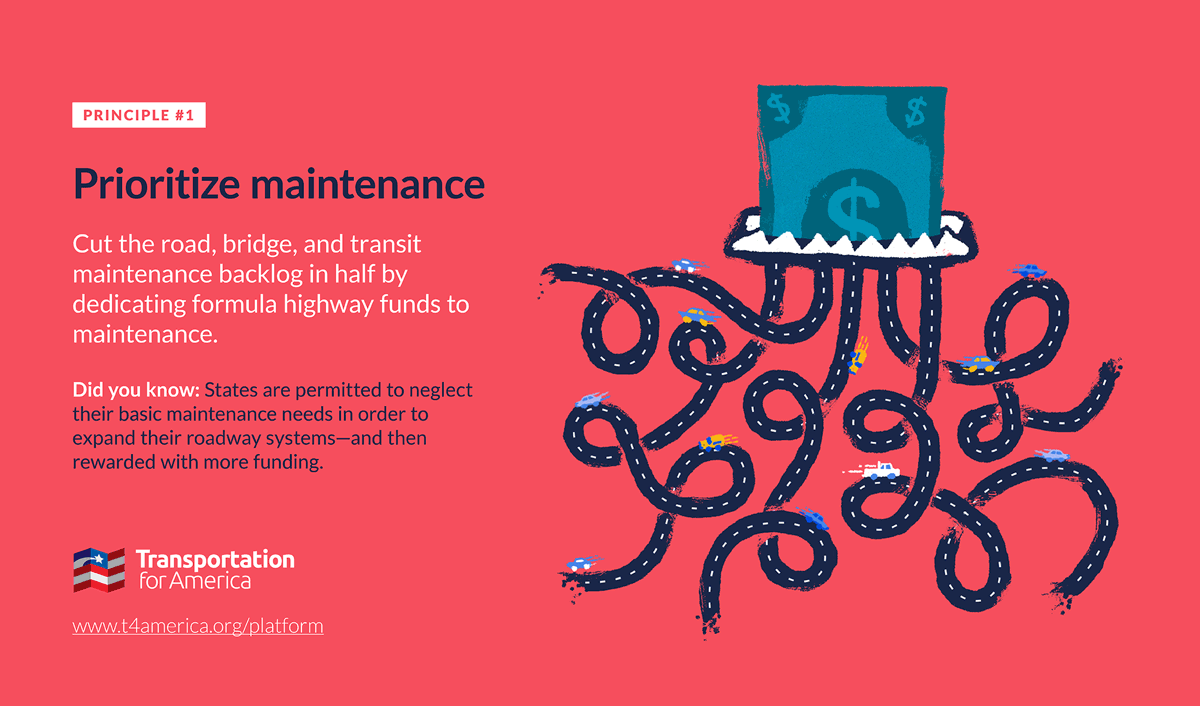Our advice to USDOT and Congress: Make no little plans

A Senate committee called Transportation Secretary Pete Buttigieg to testify about implementing the new infrastructure law, but much of the day was spent criticizing or defending FHWA’s nonbinding memo encouraging states to prioritize state of good repair, safety, and climate mitigation—displaying a deep confusion in some members of Congress about the limits of USDOT’s authority.
On the heels of the president’s State of the Union address the night before, the Senate Committee on the Environment and Public Works (EPW) convened a hearing on March 2, 2022 to talk about the infrastructure law.
Senator Carper (D-DE) opened with a discussion of the pivotal work the Committee took in formulating and passing the infrastructure law last year, and continued to underscore the need to take action on climate change (with Senator Carper noting 28 percent of emissions coming from transportation) as well as safety (after an alarming increase in fatalities, especially for vulnerable road users).
Over the course of the hearing, various senators chimed in to check on the implementation status of various programs or projects, whether the electrification of the transportation system versus alternative fuel options, truck parking, reconnecting communities, Carbon Reduction and PROTECT formula programs, transportation accessibility, Buy America, or port infrastructure. But a considerable amount of discussion from a number of senators—most notably by ranking member Senator Capito (R-WV)—focused on the nonbinding FHWA memo released on December 16 (which T4America supported as a strong statement about how states should absolutely choose to spend this historic influx of cash).
In her opening remarks, Senator Capito deemed the FHWA memo a threat to the policy framework of the infrastructure law that the committee worked so hard to put together, advancing a partisan Biden administration agenda and creating a system of winners and losers depending on the project. Using large visual aids, Senator Capito accused FHWA of plagiarizing language in the memo about fix-it-first over capacity expansion from the House’s INVEST Act. The crux of Capito’s opposition to the memo is the suggestion of a (non-existent) mandate (and a one-size-fits-all context) in the fix-it-first language over capacity expansion. In later commentary, Senator Cramer (R-ND) went further by noting that the memo was threatening the concept of federalism and the powers that states have.
As Jeff Davis at Eno noted on Twitter, this is completely false:
As Secretary Buttigieg pointed out during the hearing, the memo serves as a values document (not a mandate or part of the infrastructure law), incorporating what USDOT is hearing from states and previous transportation reauthorizations. He also noted it would be a disservice to not remind the states of their flexibility to pursue goals like repair, safety, climate change, and equity.
Senator Carper jumped into the conversation at this point to provide a core history lesson regarding state of good repair from (1) Congressional values in the federal transportation program that are codified into law and (2) values shared by a previous Republican administration, underscoring how the FHWA memo is entirely consistent with pre-established values. Senator Cardin (D-MD) also added that these values expressed in the FHWA memo are key priorities that are also reflected in the infrastructure law and shouldn’t be surprising.
Overall, the day was full of much fury, signifying very little.
Republicans on the committee fiercely claimed that this unenforceable, nonbinding memo was in fact enforceable. They claimed that encouraging states to improve the state of repair, improve safety, and reduce the negative impacts of the transportation system goes against Congressional intent, that it will block projects like highway expansions, and that it lays out how competitive grant applications will be reviewed.
Let us be clear: an unenforceable memo cannot stop anything or make any state choose to spend their money more responsibly. We agree that the language of the law failed to move the needle enough on topics like safety, repair, climate, etc. But we’re frankly shocked to hear the memo’s critics admit their preference for the broken status quo so boldly. This administration will and should evaluate projects for competitive, discretionary funding that they control using their priorities, which is how competitive grant programs have always been implemented by all administrations.
Those who spent the day vociferously criticizing this memo are either ignorant to the law and how the program works, or they are just boldly stating their lack of interest in the outcomes they promised the American people when they passed the IIJA. Both are really bad news. It’s disconcerting that the bulk of this hearing was spent fighting about a priority statement—an utter waste of time. The lesson we hope USDOT gets from this is to be bold and not waste time with little plans. This modest action they took got all the blow back of a truly controversial move while in fact accomplishing nothing. As we move forward on the implementation of the IIJA, we hope USDOT and the EPW Committee reflects on the words of the architect and planner Daniel Burnham:
Make no little plans. They have no magic to stir men’s blood and probably will not themselves be realized. Make big plans, aim high in hope and work, remembering that a noble, logical diagram once recorded will never die, but long after we are gone will be a living thing, asserting itself with ever growing insistency.






















1 Comment